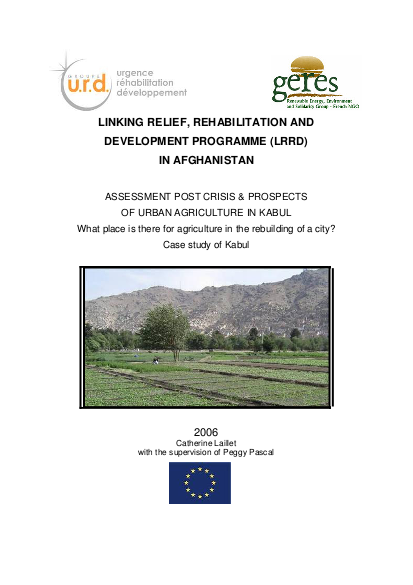
Since 1978, Afghanistan has been severely affected by conflict and crises. The country was marked by the Jihad from 1979 onwards, and then by a civil war from 1989, which was particularly destructive in Kabul, the capital, from 1992 onwards. The Taliban took over power in Kabul in 1996. After nearly 25 years of war, Afghanistan is a country that has been drained of its resources and where everything needs to be rebuilt. From these years of conflict and occupation, the agricultural sector has been considerably weakened: most of the irrigation systems and orchards have been destroyed and livestock has been reduced by a third. Moreover agriculture has also been severely affected by a country-wide drought (1999 to 2001).
In 2001, the city of Kabul was liberated and control passed into the hands of the international community. At this time, Kabul counted 700,000 inhabitants and subsequently experienced one of the world’s greatest return movements of refugees (Grinnell, 2004). According to the CSO, roughly three million people fled the countryside to take refuge in the cities (mainly in Kabul). The city then experienced an annual demographic growth rate of 17% (Schütte, 2006). Today its population is estimated at 3.5 million.
The city was not prepared to accommodate such a large influx of people. With a population density of 10,000 ihts/km² (AISA, 2004), housing has become one of the principal concerns for the Kabulis. Rent soared by 280% (Grace, 2003), unoccupied land became extremely scarce and reached exorbitant prices. The city continued to expand, newcomers were obliged to settle wherever they could, building houses and establishing informal settlements on the hills and at the bottom of the mountains
Resource collections
- UN Habitat - Urban Response Collection
- Urban Response - Urban Crisis Preparedness and Risk Reduction
- Urban Response Collection - Community Engagement and Social Cohesion
- Urban Response Collection - Economic Recovery
- Urban Response Collection - Environment and Climate Change
- Urban Response Collection - Housing, Land and Property
- Urban Response Collection - Urban Crisis Response, Recovery and Reconstruction
- Urban Response Collection - Urban Resilience